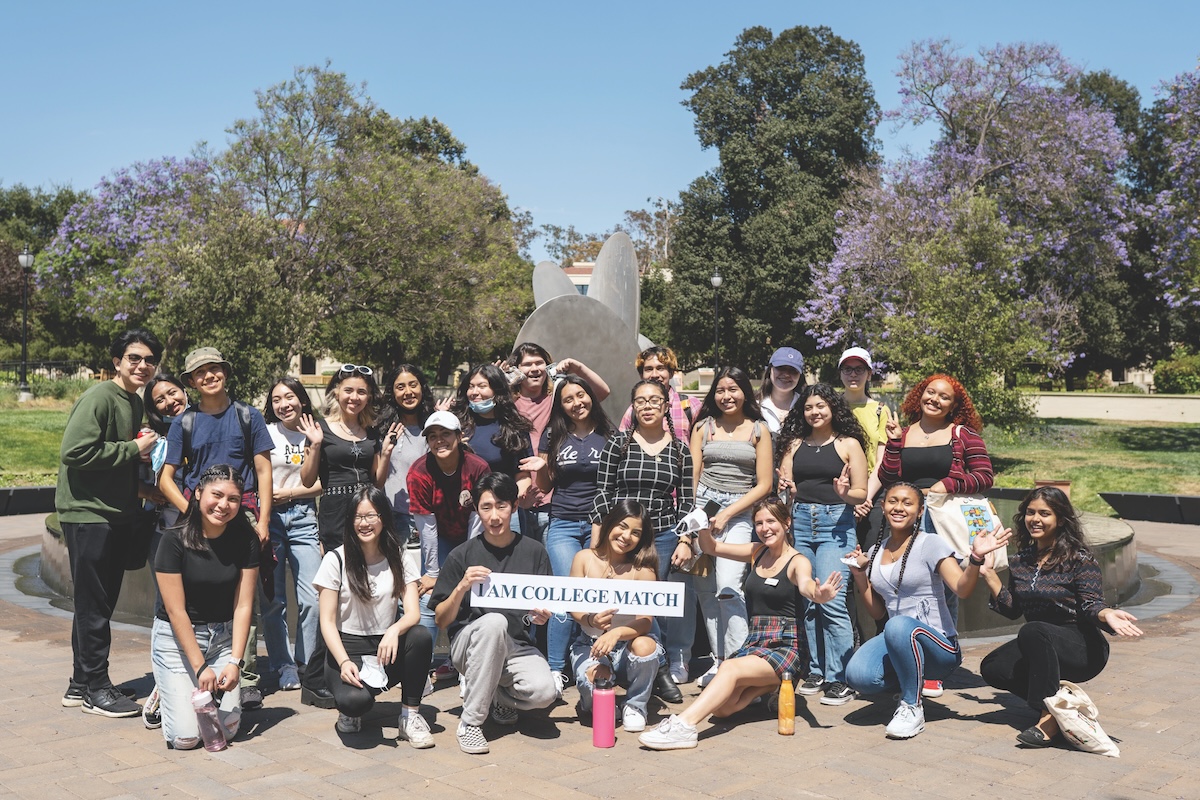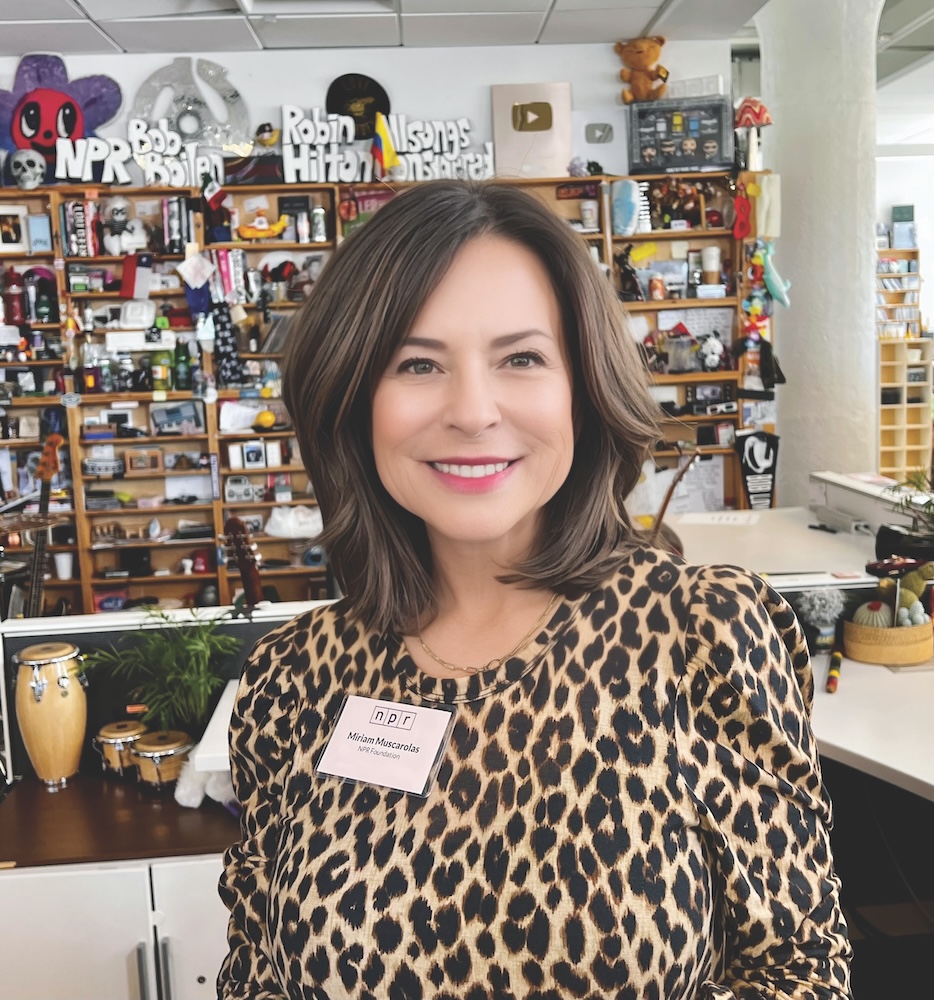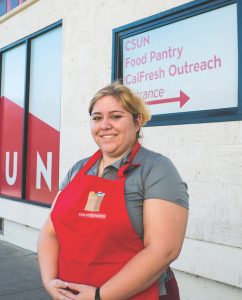Miriam Muscarolas: Aligning Portfolios With the Mission

With a long and fulfilling career in investment banking and investment management under her belt, Miriam Muscarolas is an expert on leveraging philanthropic giving. She brought her invaluable experience to the Weingart Foundation after joining its board of directors in 2008.
An immigrant from Cuba and long-time Los Angeles resident, whose family moved to the United States when she was just a toddler, Muscarolas grew up in a tightly budgeted household leading her to strive to achieve financial independence. While still in high school, she found an opportunity to take a part-time job at Wells Fargo, setting the foundation for her path to receive an invitation to join Wells Fargo’s MBA training program, and after stints with increasing responsibility at several major banks, joining Kayne Anderson Capital Advisors in 2001 and becoming a partner and senior managing director in 2006.
She took her talents to serve on the board of directors with the Weingart Foundation where she employed her expertise to the cause of leveraging the power of giving for the benefit of economic, racial, and social justice causes. In her capacities, she’s provided people with the same kind of opportunities she was given access to while still a student.
Muscarolas recently retired from the board of directors due to term limits after 16 years of service, but her ties to Weingart’s mission remain as strong as ever. Now a private investor and advisor, she’s also a member of the President’s Council for the NPR Foundation and currently serves on the board of directors for KCRW.
Q: Tell us about the Weingart Foundation and your philanthropic connection with them.

Miriam Muscarolas: The Weingart Foundation is one of the leading foundations in Los Angeles with over $850 million in investments and its giving is dedicated to Southern California. Since its founding over 70 years ago, the foundation has provided over $1 billion in grants to thousands of nonprofits across the region. When I joined, the giving focused on serving the underserved in the areas of health, education, and human services. Around 2014, the board began an assessment of the needs of the communities we served, and began to shift the focus to advancing racial, social, and economic justice in Southern California.
In 2016, the assessment journey was catalyzed by the foundation’s “Equity Commitment” which aimed to base all decisions on promoting fairness and opportunity. The board understood that traditional philanthropy was not sufficient; rather we had to use every tool at our disposal to create impact. We shifted from what had been a conventional portfolio to one that would aim to drive significant societal change while also pursuing above-market returns. We pursued innovative investment strategies where every manager would be mapped to its ability to optimize impact, diversity, and generate alpha.
Q: In 2019, the Weingart Foundation established the John W. Mack Movement Building Fellowship Program, named for a civil rights activist and former board member. Mack himself is quoted as saying “we need more marathon runners for equality and more marathon runners for justice.” How is the program doing?
A: I had the privilege of knowing John Mack way before he and I were both on the Weingart board. When I was being recruited, he knew me well from other board service and said I’d be the right person at the right time to join. It was an honor to work in tandem with a civil rights icon and I miss the wisdom and integrity he brought to his service to the Weingart board over his 13-year tenure.
As for the program itself, it’s been very successful working as a catalyst for community activists and leaders to become more effective as they lead their own organizations and get others involved in their communities. In many ways it helps teach people how to become leaders and advocates. Not everyone has that confidence; not everyone thinks they’re the person to do the job, or some people experience burnout and lose the confidence they once had. What the John Mack program demonstrates is that anyone with the right resources and education can be those people leading the charge for change.
As of this interview, we’ve had 40 rising leaders spread among the five-county Southern California region and two of the alumni are now co-facilitators of the program.
Q: Looking at your philanthropic history with your support of children’s rights and voices for justice along with your passion for supporting public media, how do you feel your areas of philanthropy intersect?
A: The Weingart Foundation has been instrumental in guiding my own personal philanthropy towards achieving social, racial, and economic equity.
These guiding principles have informed my recent decisions to direct large gifts to educational programs, both career bound and college bound. Personally and through the foundation, we were able to make investments in skilled trades training offered by the Boys & Girls Club, L.A. Harbor, with Harbor Freight Tools for Schools as a major partner. The skilled trades training helps young people in high school and recent graduates train for high-quality, high-paying, in-demand jobs in the skilled trades such as carpentry, electrical, and plumbing. The students have the opportunity to earn while they learn, get certified, and receive referrals to job placements.
The ability to earn money while they learn distinguishes this program as these are students that would otherwise need to seek jobs in low-paying fields that don’t offer a career path.
We were also able to make a transformative grant to College Match to expand their offerings in career mentorship, internships, and job placement to include alumni mentors and ambassadors. They’ve been very successful in guiding students to apply to universities that they would have otherwise thought were outside their reach and socialize college attendance with parents who would not easily welcome their kids being so far away from home to attend college.
Both offer economic opportunities to expand the horizons of students and help them dream big. I had teachers and bosses that believed in me more than I believed in myself, and these are the same opportunities I feel responsible for offering others from immigrant families like mine.
Q: How can philanthropy do better?
A: I think that increasingly philanthropy needs to evaluate all the tools in its tool box to achieve greatest impact. It’s more than making grants. And, on the subject of grants, funders, in my opinion, can be more aggressive towards a spending rate greater than the traditional 5% per year. Additionally, tools can include program related investments (PRIs) in the form of low-interest loans and loan guarantees. Helping nonprofits become more credit worthy as measured by traditional credit providers is a huge help. Additionally, investment portfolios can and should be evaluated to align with the funder’s mission. Advocacy and partnerships with other funders can also be very important.
It’s also worth mentioning that publicizing successes is an important part of the process. Communities should want to know that you’re working hard and making progress. Success inspires us to try and succeed again. These are not occasions for modesty. With that in mind learning from things that weren’t as successful, perhaps called “failures,” should to be evaluated with lessons learned and improving next time.
Q: Given the state of politicized and biased media coverage and the proliferation of misinformation, how do you feel the public media is handling their role of being the trusted sources of news and analysis?
A: Part of the misinformation is the idea that the news media can’t be trusted, or that it’s biased, or that we each are entitled to our own facts. So if that’s the belief system, it becomes pretty difficult to gain trust. NPR reports with high integrity, high journalistic standards with multiple sources, and well-researched facts. Retractions should be rare, quick, and not just in small print. In many communities around the country, the only reliable news source is the public television and radio station. These communities are news deserts as many local sources have shut down.
NPR’s strategy of collaborative journalism, working closely with networks of over 200 local stations, is transformative. When a major event happens in a community, there are local stations on the ground who can be the eyes and ears of the fact-gathering and reporting.
It’s incumbent on the media to do a better job of presenting facts and helping the consumer differentiate between news and opinion. It’s also each of our own responsibility to become better consumers of information, more analytical listeners, and not listen exclusively to sources which only confirm our own opinions.
Q: What are the biggest challenges facing Los Angeles right now?
A: It’s clear that homelessness is a major issue in L.A. Mayor Bass is making progress, but the problem is so large that it’s challenging to move the needle. At the heart of it is the lack of housing affordability in Los Angeles. There needs to be an appetite for us to solve the problems that we ourselves created with process and regulations that were intended to do good but have created much higher costs and barriers.
Secondly, I think traffic is a major barrier in Los Angeles; it has been for decades. Our city and county are so spread out that we seem to have lost our urgency for traffic solutions. The result is that it keeps us in our own zip codes, our own bubbles, because it’s too hard to get anywhere. It takes too much time. It’s too much of a hassle. Whether traffic gets solved by advances in mass transit – which I think is essential – or employers offering more flexible schedules including remote work, I think we all crave a community that’s diverse, interesting, culturally stimulating, and that you can participate in more easily.
With the Olympics coming in just four short years, I am cautiously optimistic that innovative solutions for affordability and transit options will be designed, tested, and implemented that will last beyond the Olympics. We each need to be invested in making changes.
Q: What are the biggest challenges facing California right now?
A: Affordability, a wealth gap among the highest earners in the country, lack of a diversified employment market with stable, high paying jobs, urban sprawl, and environmental issues such as wildfires and climate change are among the major problems.
Q: Shortly before we conducted this interview, Tyreek Hill, an elite football player for the Miami Dolphins, was stopped in his car, outside his home stadium, and put in handcuffs in a much-publicized altercation with local police. Much was talked about in terms of what needed to be done in the aftermath of George Floyd, but yet here was another video of a Black man being forcibly dragged from his car at the hands of clearly over-agitated police. Where does racial justice and the philanthropy advocating for equality go from here?
A: That is a huge, important, and challenging issue and there is insufficient time in this interview to do the subject justice. Weingart’s focus on racial justice began nearly 10 years ago with the commitment to address the symptoms of structural inequities; to prioritize underfunded Black and Brown-led nonprofits; to bring together organizations so they may learn from one another and design programs that can be modeled by others. The Foundation is intent on building power for transformative change with initiatives in youth organizing and movement leadership development. Effective work requires partnership with others including private public partnerships. I think Weingart Foundation can be a model for others and many other organizations are also doing important work towards advancing dignity, respect, trust, and justice for all our communities.
We all want a joyful life. Philanthropy can’t save the world single-handedly though. It has to be combined with effective public policy.
